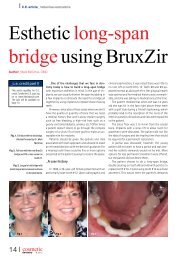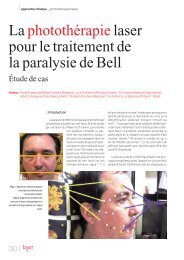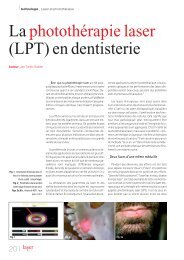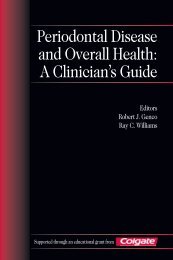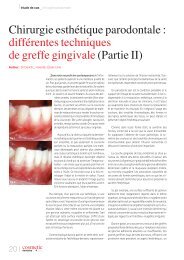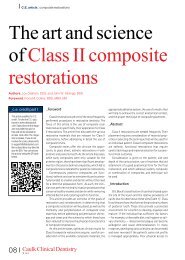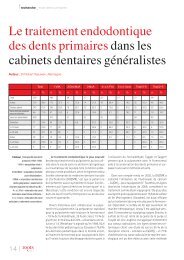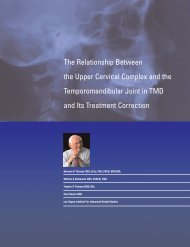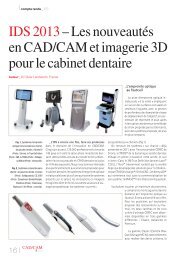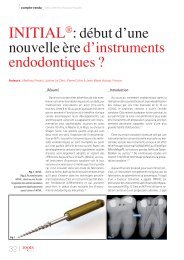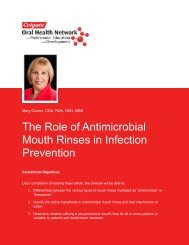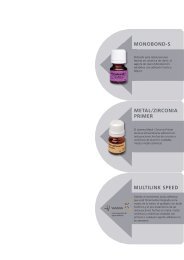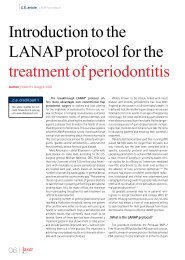Periodontal Disease and Overall Health: A Clinician's Guide
Periodontal Disease and Overall Health: A Clinician's Guide
Periodontal Disease and Overall Health: A Clinician's Guide
Create successful ePaper yourself
Turn your PDF publications into a flip-book with our unique Google optimized e-Paper software.
CHAPTER 3 Infection <strong>and</strong> Inflammation 33for the initiation <strong>and</strong> progression of a varietyof inflammatory diseases, including arthritis,peptic ulcers, <strong>and</strong> appendicitis. As a result,therapeutic full-mouth extractions became acommon dental practice. However, many teethwere extracted without evidence of infection.When it was finally realized that there wasno therapeutic benefit, the theory was finallydiscredited <strong>and</strong> the practice ab<strong>and</strong>oned. Duringthe final two decades of the twentiethcentury—as our knowledge concerning theinflammatory component of systemic diseaseswas enriched <strong>and</strong> our underst<strong>and</strong>ing ofthe relationship of periodontal disease tosystemic inflammation increased—the ideathat periodontal infection may affect theprogression of systemic disorders such ascardiovascular disease, adverse pregnancycomplications, diabetes mellitus, <strong>and</strong> otherdiseases re-emerged.In this possible association, systemicinflammation seems to play a key role.Specifically, on one h<strong>and</strong>, periodontal diseasemay induce systemic inflammation <strong>and</strong>on the other, there is increasing evidencesuggesting that elevated levels of the markersof systemic inflammation are associatedwith an increased risk for systemic diseases.Cardiovascular <strong>Disease</strong> (CVD)There is now abundant clinical evidencedemonstrating that many biomarkers of inflammationare elevated years in advance offirst-ever myocardial infarction (MI) orthrombotic stroke, <strong>and</strong> that these same biomarkersare highly predictive of recurrentMI, recurrent stroke, <strong>and</strong> death due to CVD. 2Moreover, studies demonstrate that serumIL-6 levels were significantly elevated insubjects who subsequently experienced anMI compared to age-matched controls. 34Similarly, plasma levels of soluble P-selectin,soluble CD40L, <strong>and</strong> macrophage-inhibitorycytokine-1 were all significantly increased inhealthy subjects who subsequently developedCVD events compared to matched controls. 35Elevated plasma concentrations of TNF-αhave also been associated with CVD, <strong>and</strong>specifically with recurrent nonfatal MI orother CVD events. Moreover, TNF-α levelswere persistently higher among post-MIpatients at increased risk for recurrent coronaryevents.Besides these pro-inflammatory cyto -kines, several acute-phase reactants have alsobeen associated with CVD. One of the factorswith the strongest evidence as a biomarkerfor predicting CVD events is CRP(specifically, high sensitivity CRP, hsCRP).When measured in the blood, hsCRP provedto be a strong, independent predictor of futureMI <strong>and</strong> stroke among apparently healthyasymptomatic men. Also, the relative riskfor first MI <strong>and</strong> ischemic stroke increasedsignificantly with each increasing quartileof baseline concentrations of CRP. 36 As describedalready, CRP may contribute to theinitiation <strong>and</strong> development of atherothromboticlesions not only by up-regulating theexpression of pro-inflammatory cytokines,but also by mediating proliferation <strong>and</strong> activationof SMCs <strong>and</strong> by activating the procoagulantsystem. This last property may befurther enhanced by another acute-phase protein,fibrinogen, which is often found to beelevated in CVD patients.Adverse Pregnancy OutcomesSystemic inflammation has also beenimplicated in adverse pregnancy outcomes,since elevated concentrations of CRP in earlypregnancy are associated with an increasedrisk of preterm birth <strong>and</strong> very-preterm birth.Diabetes MellitusFinally, systemic inflammation hasbeen associated with both Type 1 <strong>and</strong> Type2 diabetes mellitus. Recent studies suggestthat in Type 1 diabetes, the levels of systemicmarkers of inflammation, such as CRP,do not differ between healthy individuals<strong>and</strong> subjects for which Type 1 diabetes has



